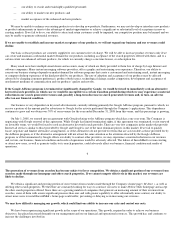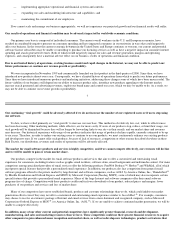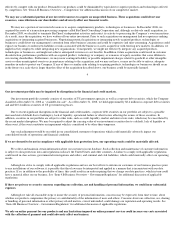Incredimail 2008 Annual Report Download - page 18
Download and view the complete annual report
Please find page 18 of the 2008 Incredimail annual report below. You can navigate through the pages in the report by either clicking on the pages listed below, or by using the keyword search tool below to find specific information within the annual report.
directors pursuant to the Israeli Companies Law. We have also contracted an internal auditor and a consultant for implementation of and
compliance with the requirements under the Sarbanes-Oxley Act. See “Item 5 Operating and Financial Review and Prospects – Overview –
General and Administrative Expenses” for a discussion of our increased expenses as a result of being a public company.
17
A small number of existing shareholders hold a significant percentage of our outstanding ordinary shares and can exercise significant
influence over our actions.
As of May 31, 2009, our directors and officers beneficially owned (including shares issuable upon exercise of options exercisable within 60
days of such date) approximately 42% of our outstanding ordinary shares in the aggregate. The interests of these shareholders may differ from
your interests. These shareholders, acting together, could exercise significant influence over our operations and business strategy and will have
sufficient voting power to influence all matters requiring approval by our shareholders, including the ability to elect or remove directors, to
approve or reject mergers or other business combination transactions, the raising of future capital and the amendment of our articles of association,
which govern the rights attached to our ordinary shares. In addition, this concentration of ownership may delay, prevent or deter a change in
control, or deprive you of a possible premium for your ordinary shares as part of a sale of our Company.
The rights and responsibilities of our shareholders are governed by Israeli law and differ in some respects from the rights and
responsibilities of shareholders under U.S. law.
We are incorporated under Israeli law. The rights and responsibilities of holders of our ordinary shares are governed by our memorandum of
association, our articles of association and by Israeli law. These rights and responsibilities differ in some respects from the rights and
responsibilities of shareholders in typical U.S. corporations. See “Item 16.G Corporate Governance.” In particular, a shareholder of an Israeli
company has a duty to act in good faith toward the company and other shareholders and to refrain from abusing his power in the company,
including, among other things, in voting at the general meeting of shareholders on certain matters. See “Item 10.B Memorandum and Articles of
Association – Approval of Related Party Transactions” for additional information concerning this duty. Our shareholders generally may find it
difficult to comply with the provisions of Israeli law.
Provisions of our articles of association and Israeli law may delay, prevent or make difficult an acquisition of our Company, which could
prevent a change of control and, therefore, depress the price of our shares.
Israeli corporate law regulates mergers, requires tender offers for acquisitions of shares above specified thresholds, requires special approvals
for transactions involving directors, officers or significant shareholders and regulates other matters that may be relevant to these types of
transactions. In addition, our articles of association contain provisions that may make it more difficult to acquire our Company, such as provisions
establishing a classified board. Furthermore, Israeli tax considerations may make potential transactions unappealing to us or to some of our
shareholders. See “Item 10.B Memorandum and Articles of Association – Approval of Related Party Transactions” and “Item 10.E – Taxation –
Israeli Taxation” for additional discussion about some anti-takeover effects of Israeli law.
These provisions of Israeli law may delay, prevent or make difficult an acquisition of our Company, which could prevent a change of control
and therefore depress the price of our shares.
Future sales of our ordinary shares could reduce our stock price.
Sales by shareholders of substantial amounts of our ordinary shares, or the perception that these sales may occur in the future, could
materially and adversely affect the market price of our ordinary shares. In addition, our executive officers, directors and certain large shareholders
are no longer subject to contractual restrictions on the sale by them of shares, resulting in a substantial number of shares held by them or issuable
upon exercise of options currently eligible for sale in the public market. Furthermore, the market price of our ordinary shares could drop
significantly if our executive officers, directors, or certain large shareholders sell their shares, or are perceived by the market as intending to sell
them.
Although we have paid dividends in the past, and we expect to pay certain dividends in the future, our ability to pay dividends may be
adversely affected by the risk factors described in this report; if we fail to, or to extent we do not, pay dividends the return on investment
will be limited to the value of our stock.
We have paid dividends in the past, and on March 25, 2009, we announced that our board of directors had approved a cash dividend of
approximately $4.6 million, or $0.50 per share, subject to Israeli court approval and a tax pre-ruling from the Israeli Tax Authority as required by
Israeli law. Our ability to declare a dividend, and the amount of any dividend if declared, may be adversely affected by the risk factors described
in this report. The declaration of a dividend and the amount of any dividend will depend on our earnings, financial condition and other business
and economic factors affecting us at the time as our board of directors may consider relevant. We may pay dividends in any fiscal year only out of
“profits,” as defined by the Israeli Companies Law, unless otherwise authorized by an Israeli court, and provided that the distribution is not
reasonably expected to impair our ability to fulfill our outstanding and expected obligations. If we do not pay dividends, our stock may be less
valuable because a return on your investment will only occur if our stock price appreciates. See “Item 8.A Consolidated Statements and Other
Financial Information
–
Policy on Dividend Distribution
”
for additional information regarding the payment of dividends.
























